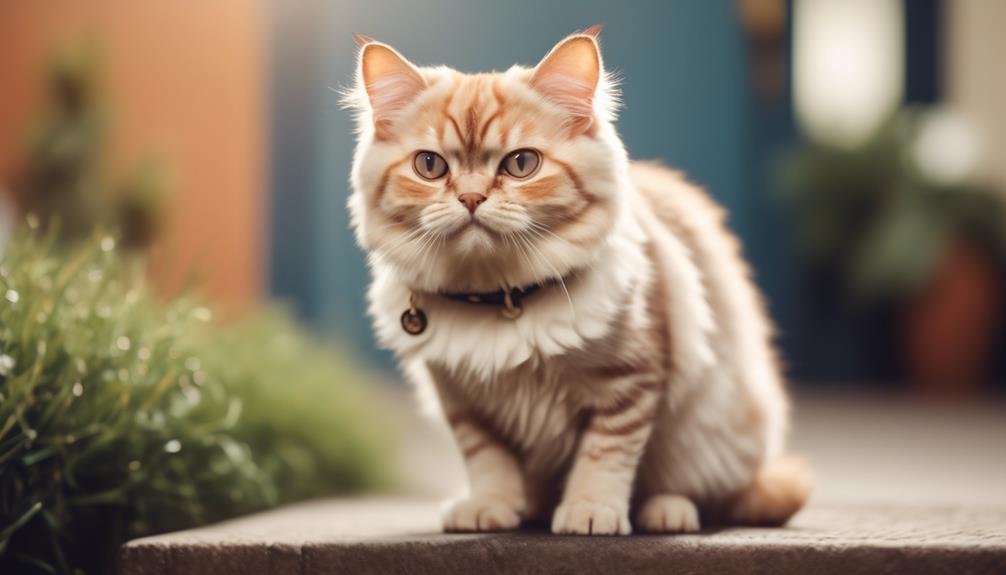
The Napoleon mixed cat breed, a fascinating combination of Munchkin and Persian cats, has been gaining popularity since its development in the 1990s.
While not yet universally recognized by all cat associations, this breed’s unique characteristics and charming personality have captured the hearts of many feline enthusiasts.
However, before considering bringing a Napoleon into your home, it is essential to understand the breed’s origins and characteristics and the importance of responsible adoption or ethical breeding practices.
In this discussion, we will explore the intriguing history of Napoleon cats, their size and coat variations, their socialization and bonding tendencies, and the necessary steps to maintain their overall health and well-being.
Prepare to be captivated by the enchanting world of Napoleon mixed cat breeds.
Key Takeaways
- Napoleon cats are a small to medium-sized breed originating from a crossbreeding of Munchkin and Persian cats in the 1990s.
- They are an experimental breed and not yet recognized by all cat associations.
- Napoleon cats are known for being playful, affectionate, and people-focused and easily bond with their owners.
- Regular veterinary checkups are important for maintaining their health, as they may be predisposed to health conditions seen in Munchkin and Persian breeds.
Origin and Development
The Napoleon cat breed originated in the United States in the 1990s through the intentional crossbreeding of Munchkin and Persian cats.
This experimental breed was developed by breeders seeking to combine the short-legged trait of the Munchkin with the luscious coat of the Persian.
The goal was to create a small to medium-sized cat with a compact body, short legs, and a long or short coat in various colors and patterns.
The breed gained recognition and popularity through the efforts of breeder Teri Harris.
Although not yet recognized by all cat associations, the Napoleon breed was officially acknowledged by the International Cat Association (TICA) in 2011.
Napoleon cats can be found in shelters, rescue groups, and reputable breeding establishments today.
See another cat breed profile.
Nebelung Cat Breed
Size and Breed Group
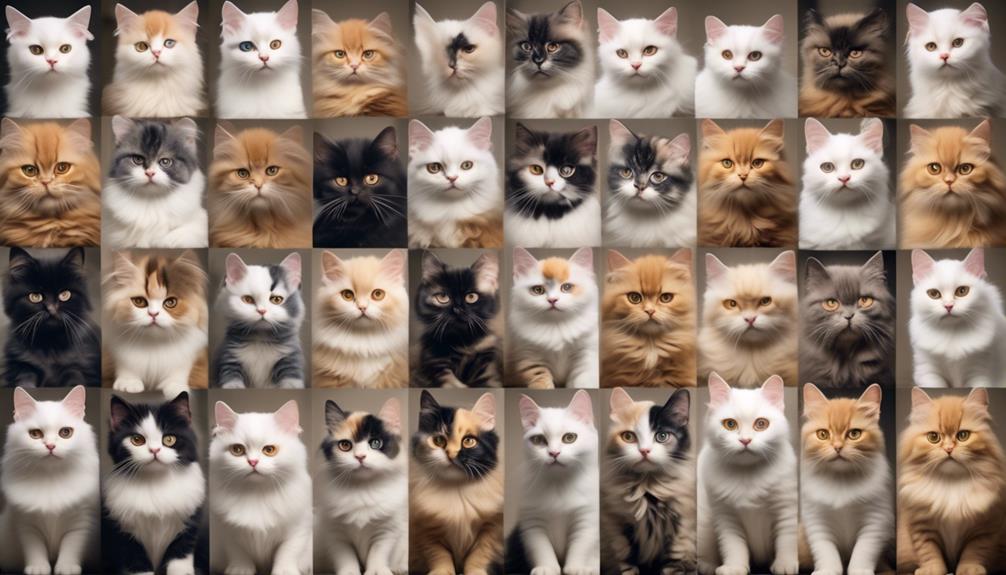
Napoleon cats belong to the small to medium size category and are classified as an experimental breed, not yet recognized by all cat associations.
They typically weigh five to nine pounds, although some individuals may be smaller or larger than average.
These cats come in a wide range of colors, with coat patterns varying from short-haired to long-haired.
The grooming needs of Napoleon cats depend on their coat length.
Short-haired Napoleons require weekly brushing, while long-haired Napoleons need more frequent brushing to prevent matting.
Despite their experimental breed status, Napoleon cats are generally adaptable to different climates.
However, it is important to provide them with shade and fresh water during hot months.
The table below provides a summary of Napoleon’s cat size and coat color variations:
| Size | Weight Range |
|---|---|
| Small | 5-9 pounds |
| Coat Color | Various |
| Coat Type | Short-haired |
| Long-haired |
Lifespan and Coat Variations
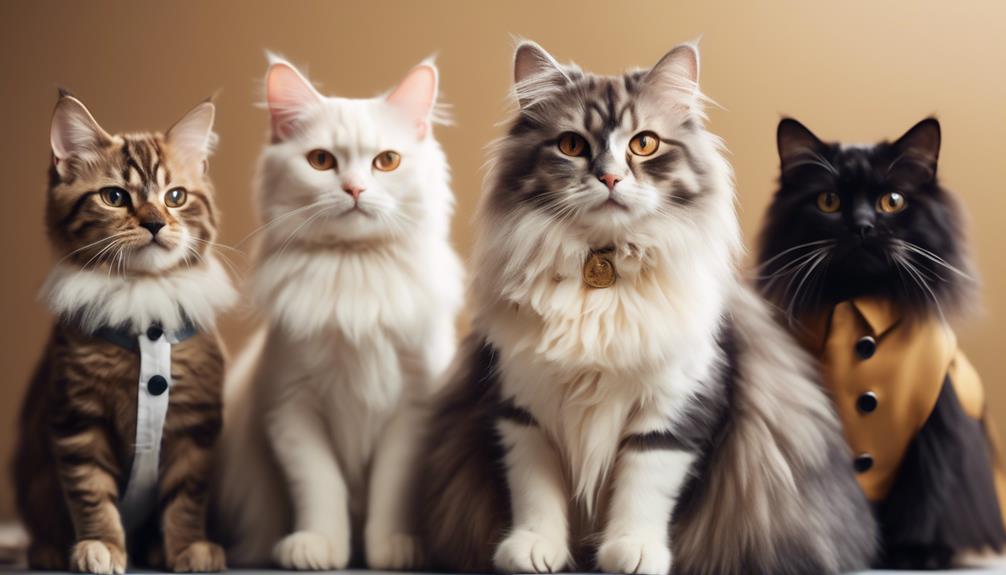
With a lifespan of 12-15 years, Napoleon cats exhibit various coat variations that contribute to their unique appearance.
These coat variations can range from short to long hair and come in various colors and patterns.
Here are four interesting characteristics of Napoleon cat coats:
- Coat length: Napoleon cats can have short or long hair, requiring different grooming needs. Short-haired Napoleons typically require weekly brushing to maintain their coat, while long-haired Napoleons need more frequent brushing to prevent matting.
- Color diversity: Napoleon cats come in various colors and patterns, including solid, tabby, tortoiseshell, and pointed. This variety allows for a visually appealing and diverse population of cats.
- Unique markings: Besides their coat colors, Napoleon cats can exhibit distinctive markings such as spots, stripes, and patches. These markings add to their individuality and stand out among other cat breeds.
- Fluffy or silky texture: Napoleon coats can have a soft or smooth texture depending on the individual cat. This adds to their charm and makes them enjoyable to pet and cuddle with.
History of Napoleon Cats
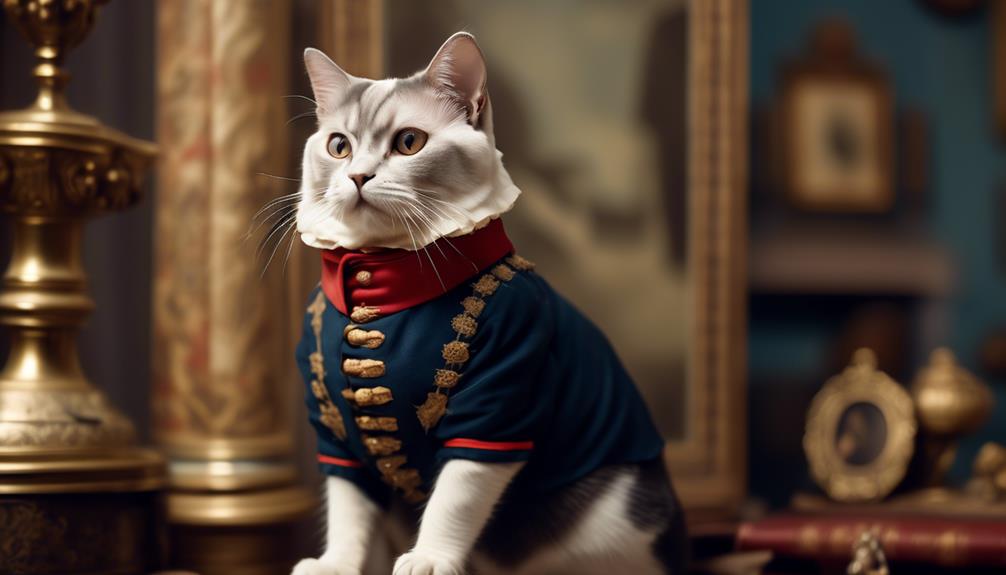
After exploring Napoleon cats’ lifespan and coat variations, it is essential to delve into the intriguing history behind this unique mixed breed.
The history of Napoleon cats can be traced back to 1996, originating from a crossbreeding of Munchkin and Persian cats.
Breeder Teri Harris popularized this breed, and they were officially acknowledged by the International Cat Association (TICA) in 2011.
Today, Napoleon cats can be found in shelters or rescue groups, making adoption a viable option for those interested in this breed.
However, if purchasing a Napoleon cat, it is important to choose a reputable breeder who prioritizes the health and temperament of the cats.
Thorough research on the breeder’s practices is recommended to discourage unethical breeding practices.
Popularity and Recognition
The popularity and recognition of Napoleon cats have steadily increased since their official acknowledgment by the International Cat Association (TICA) in 2011.
This recognition has increased interest in the breed as more people become aware of their unique characteristics and charming personalities.
Here are four reasons why Napoleon cats have gained popularity:
- Adorable Appearance: With their short legs and round faces, Napoleon cats have an irresistibly cute and cuddly appearance that captures the hearts of cat lovers.
- Playful Nature: Napoleon cats are known for their active and energetic nature, making them entertaining companions for children and adults.
- Compatibility with Other Pets: Napoleons have a friendly and social temperament, allowing them to get along with other pets in the household easily.
- Low Maintenance: Despite their long or short hair, Napoleon cats have relatively low grooming requirements, making them suitable for busy individuals or families.
As the popularity of Napoleon cats continues to grow, more people are discovering the joy of having these delightful feline companions in their lives.
Adoption Options for Napoleons
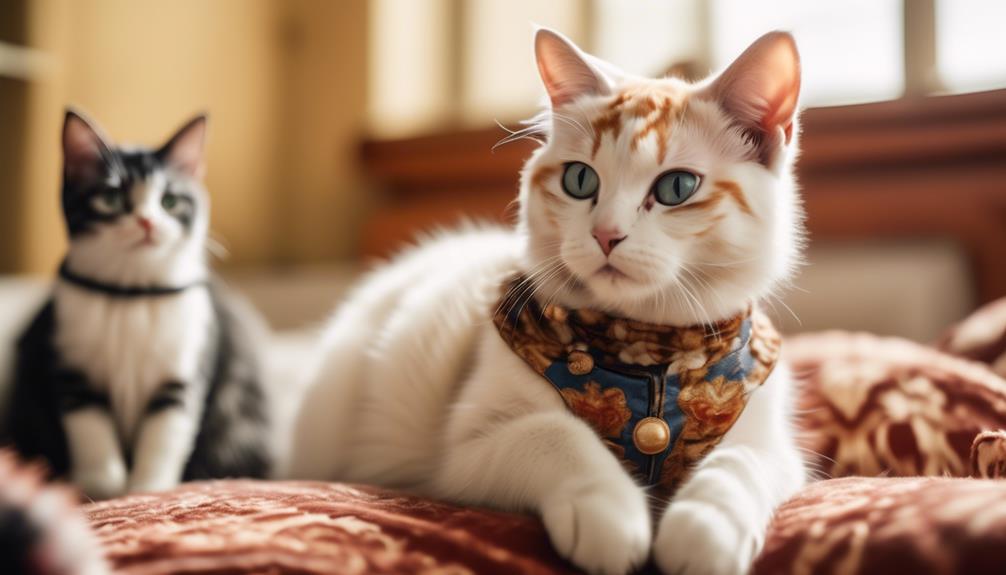
Following their increased popularity and recognition, those interested in adopting a Napoleon cat have several options.
One option is to check local animal shelters or rescue groups, as Napoleon cats can sometimes be found there.
Adopting these organizations not only gives a cat in need a loving home but also supports rescuing and rehoming cats.
Another option is to purchase a Napoleon cat from a reputable breeder.
It is important to conduct thorough research on the breeder’s practices, ensuring they prioritize the health and temperament of their cats.
By discouraging unethical breeding practices, potential owners can contribute to the well-being of Napoleon cats and promote responsible breeding.
Importance of Responsible Adoption
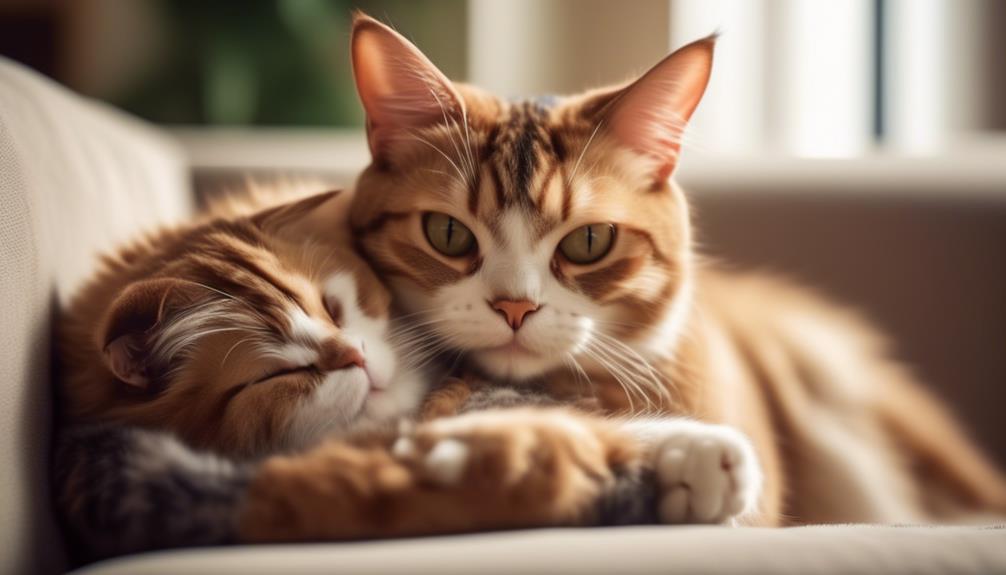
Responsible adoption is crucial when considering adding a Napoleon cat to your family.
By adopting responsibly, you ensure the cat’s well-being and support ethical breeding practices.
Here are four reasons why responsible adoption is important:
- Promote animal welfare: Adopting from rescue organizations or shelters gives deserving cats a second chance at a loving home and helps reduce pet overpopulation.
- Health and temperament considerations: Reputable breeders prioritize the health and temperament of their cats, reducing the risk of inherited genetic health conditions and ensuring a well-adjusted companion.
- Discourage unethical breeding: By adopting responsibly, you discourage corrupt breeding practices, such as excessive inbreeding or breeding for profit, that can lead to health issues in future generations.
- Support the adoption community: Choosing responsible adoption supports the work of shelters, rescue groups, and ethical breeders, helping them continue their important work in caring for and finding homes for cats in need.
Characteristics and Personality Traits
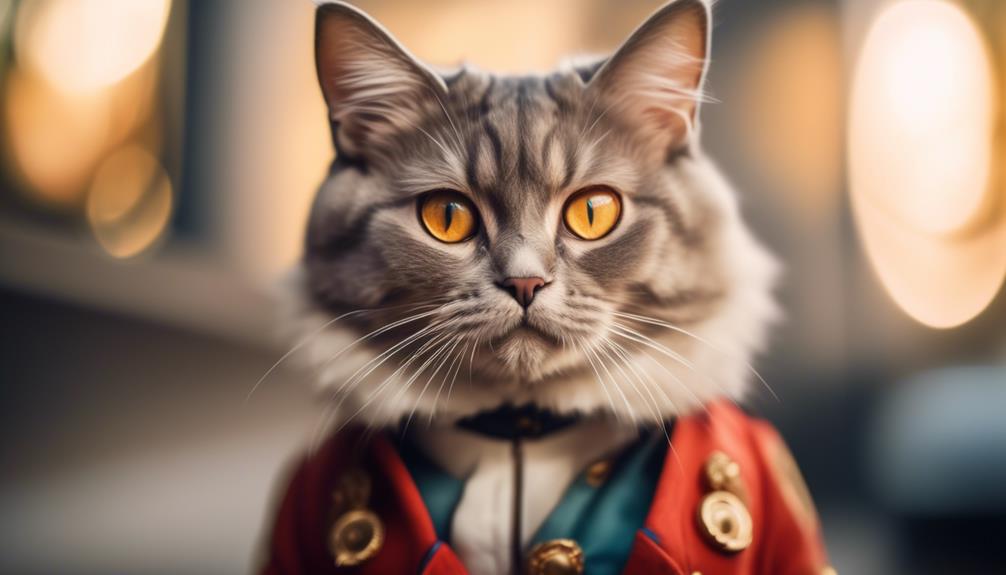
When considering adding a Napoleon cat to your family, understanding their unique characteristics and personality traits is essential.
Napoleon cats are known for their playful and affectionate nature.
They are energetic and curious, always ready for an adventure. Napoleons easily adapt to new environments and enjoy the company of their owners.
They have moderate exercise needs and can be easily trained with positive reinforcement.
Grooming requirements vary depending on the length of their coat. While Napoleon cats are generally healthy, there is a potential for genetic health conditions due to their Munchkin and Persian ancestry.
Regular veterinary checkups are important to ensure their well-being.
Overall, Napoleon cats are loving and people-focused, making them wonderful companions for families and individuals.
| Characteristics | Personality Traits | Care Requirements |
|---|---|---|
| Playful | Affectionate | Regular veterinary checkups |
| Energetic | Curious | Moderate exercise needs |
| Adaptable | People-focused | Grooming requirements vary |
| depending on coat length |
Exercise and Training Needs
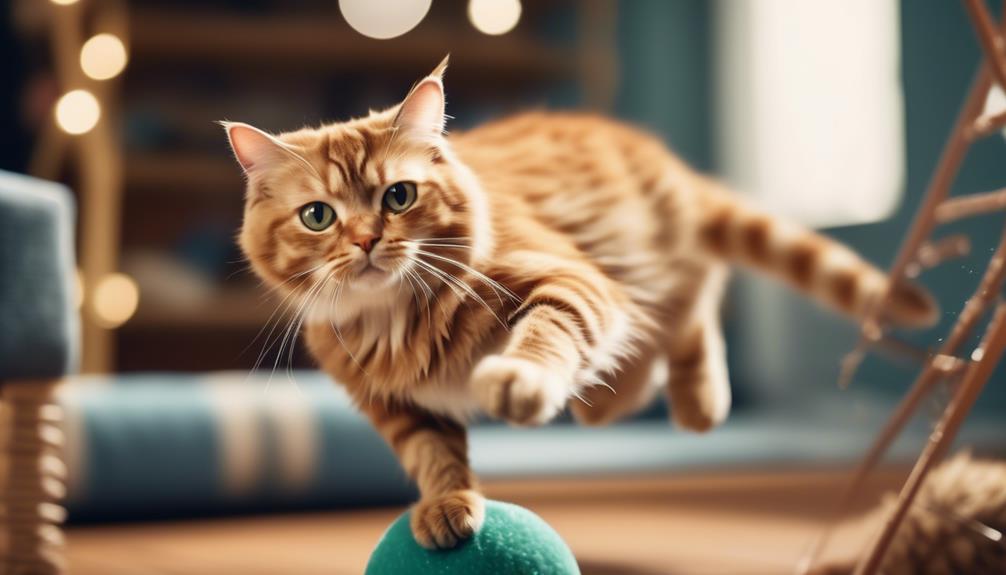
To ensure the overall well-being of Napoleon cats, it is important to address their exercise and training needs.
Here are four key points to consider:
- Moderate exercise: While Napoleon cats are not overly active, they still require regular exercise to maintain a healthy weight and prevent boredom. Engage them in interactive play sessions using toys or provide climbing structures to keep them active.
- Positive reinforcement training: Napoleons are intelligent and trainable cats. Use positive reinforcement techniques like treats or praise to encourage desired behaviors. Be patient and consistent in your training approach.
- Mental stimulation: Besides physical exercise, Napoleons thrive on mental stimulation. Provide puzzle toys or engage in interactive play to keep their minds sharp and prevent behavioral issues.
- Socialization: Napoleons are social cats and enjoy the company of humans and other pets. Regular socialization with people and exposure to different environments will help them develop into well-rounded cats.
Grooming Requirements
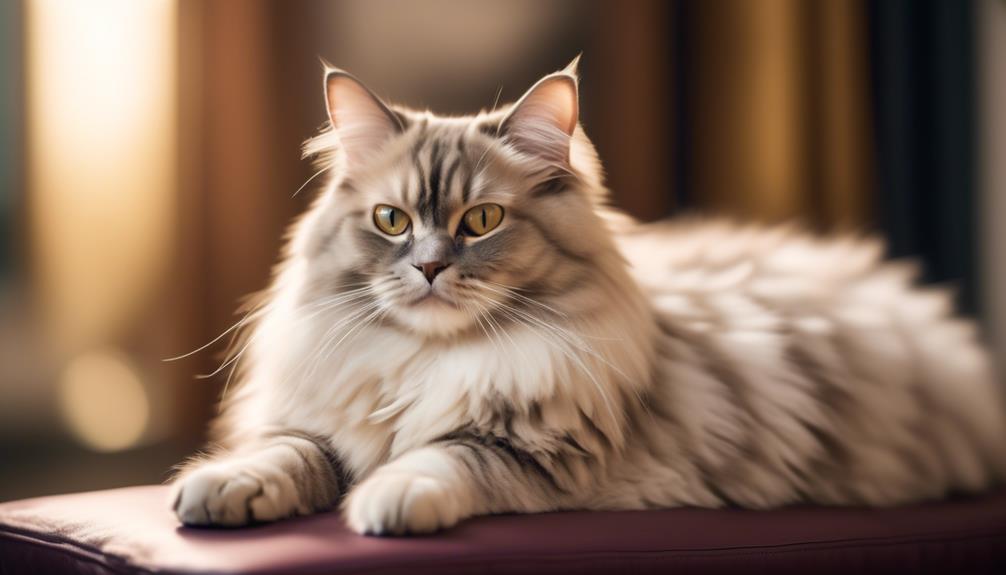
Napoleon cats require regular grooming to maintain the health and appearance of their coat.
The grooming needs of Napoleon cats depend on whether they have short or long hair.
Short-haired Napoleons generally require weekly brushing to remove loose hair and prevent matting.
On the other hand, long-haired Napoleons need more frequent brushing to prevent tangles and mats from forming.
It is essential to use a comb or brush designed for cats to avoid causing any discomfort or injury.
Additionally, regular ear examinations are important to prevent dirt buildup or infection.
A regular tooth-brushing routine is also recommended to maintain good oral hygiene.
Health Considerations
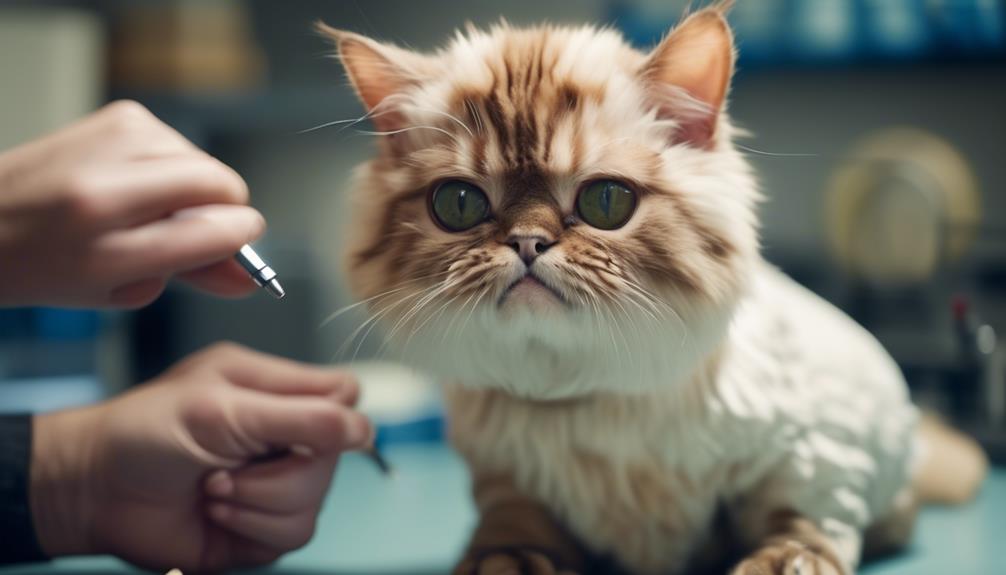
One must be aware of the health considerations associated with Napoleon cats.
These adorable mixed breed cats, developed from Munchkin and Persian cats, are generally healthy, but there are a few conditions to watch out for.
Here are four important health considerations for Napoleon cats:
- Genetic health conditions: Napoleon cats may be predisposed to health issues in their parent breeds, such as cataracts, lordosis (a spinal deformity), and polycystic kidney disease. Regular veterinary checkups are essential to monitor and manage these conditions.
- Regular care and grooming: Proper care and grooming are crucial for maintaining the health of Napoleon cats. This includes regular ear examinations to prevent infection, starting a teeth brushing routine, and providing a scratching post for healthy scratching behavior.
- Exercise and environment: Napoleon cats have high energy levels and need enough space to play and exercise. While they are adaptable to different climates, it’s important to provide shade and fresh water during hot months.
- Veterinary care and checkups: Regular veterinary checkups are necessary for maintaining the overall health of Napoleon cats. These checkups help identify potential health issues early on and ensure appropriate care and treatment.
Socialization and Bonding
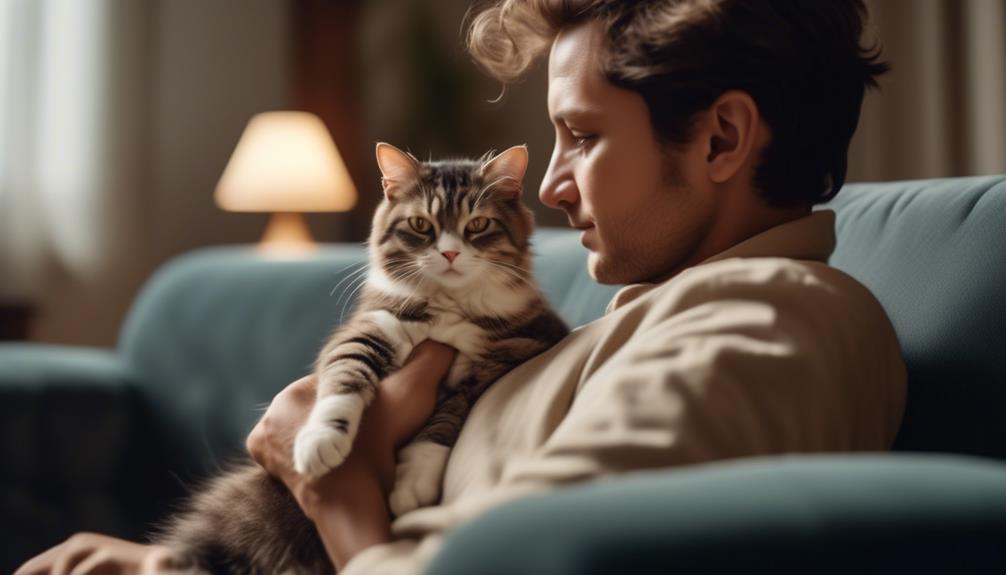
Socialization and bonding are crucial aspects of a Napoleon cat’s well-being and happiness.
Napoleon cats are known to be loving and people-focused and enjoy following their owners around.
They easily bond with humans and thrive on social interaction.
It is important to provide them with ample opportunities for play, exercise, and mental stimulation.
Socializing them from a young age is essential to ensure they develop into well-adjusted cats.
Introducing them to various environments, people, and other animals can help prevent behavioral issues and promote their social skills.
Additionally, spending quality time with them, such as through play sessions and grooming, helps strengthen the bond between the cat and their owner.
Napoleon cats can lead fulfilling and happy lives by prioritizing socialization and bonding.
Maintaining the Health of Napoleons
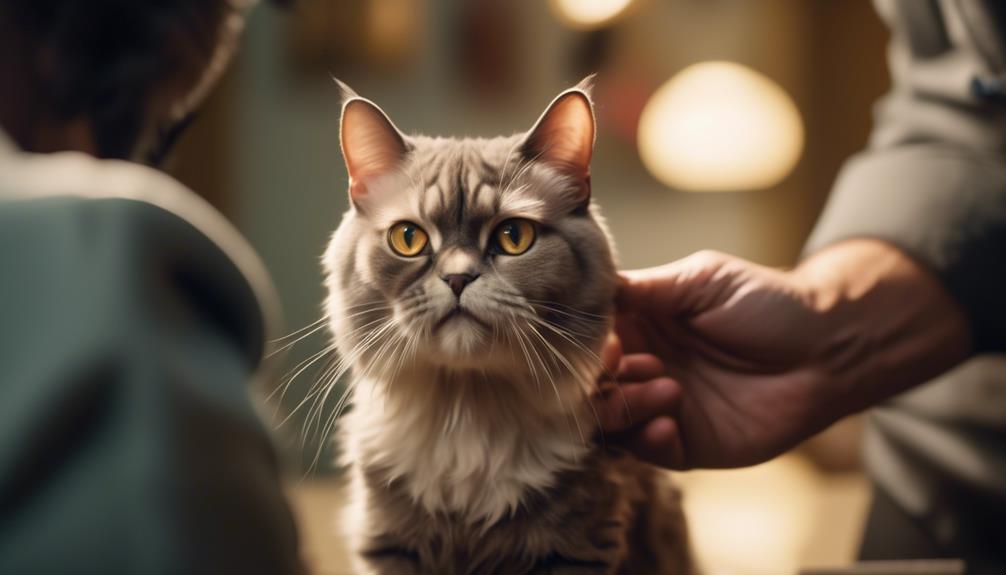
After establishing a strong foundation of socialization and bonding, it is essential to prioritize the maintenance and well-being of Napoleons through effective healthcare practices.
To ensure the health of these adorable felines, consider the following:
- Regular veterinary checkups: Napoleons may be predisposed to health conditions seen in Munchkin and Persian breeds. Regular checkups will help detect and address any potential issues.
- Scratching post and ear examinations: Providing a scratching post promotes healthy scratching behavior, while regular ear examinations prevent dirt buildup or infection.
- Teeth brushing routine: Regular brushing is recommended to maintain good oral hygiene.
- Exercise and environmental enrichment: Napoleons have high energy levels and need enough space to play and exercise. Providing a stimulating environment will keep them mentally and physically active.
Providing a Suitable Environment
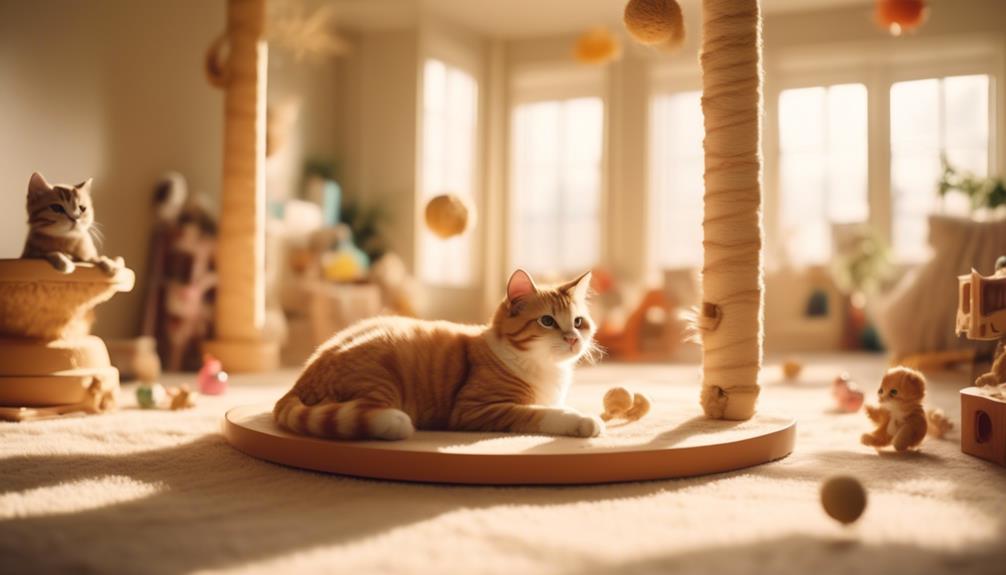
Creating a suitable environment is crucial for the overall well-being and happiness of Napoleon cats.
These cats thrive on social interaction and may not do well if left alone for long periods.
They enjoy following their owners around and snuggling up with them, making it important to provide them with plenty of human companionship.
Napoleons have high energy levels and need enough space to play and exercise, so providing them with a stimulating environment that includes scratching posts and toys is essential.
Additionally, Napoleons are adaptable to different climates, but providing shade and fresh water during hot months is important.
Size and Coat Color Diversity

Napoleon cats exhibit a diverse range of sizes and coat colors, making them visually appealing and unique among feline breeds.
Here are some key points about their size and coat color diversity:
- Size: Napoleon cats are generally small, weighing five to nine pounds. However, exact size standards may vary; some individuals may be smaller or larger than average.
- Coat Colors: Napoleon cats come in various colors, adding to their charm and individuality. From solid colors like black, white, and gray to patterns such as tabby, tortoiseshell, and calico, there is a Napoleon for every color preference.
- Grooming Needs: The grooming requirements of Napoleon cats depend on their coat length. Short-haired Napoleons typically require weekly brushing, while long-haired Napoleons need more frequent brushing to prevent matting.
- Climate Adaptability: Most Napoleon cats are adaptable to different climates. However, providing them shade and fresh water during hot months is important to ensure their comfort and well-being.
Frequently Asked Questions
Are Napoleon Cats Hypoallergenic?
Napoleon cats are not hypoallergenic.
While their small size and low-shedding coat may cause fewer allergies in some individuals, they still produce allergenic proteins in their saliva and skin, making them unsuitable for people with severe allergies.
How Much Do Napoleon Cats Cost on Average?
The average cost of a Napoleon cat can vary depending on factors such as pedigree, breeder reputation, and geographical location.
Generally, Napoleon cats can range in price from $1,000 to $2,500 or more.
It is important to prioritize finding a reputable breeder who prioritizes the health and well-being of their cats.
Can Napoleon Cats Live With Other Pets?
Napoleon cats can generally live with other pets, but individual temperament and socialization play a role.
Proper introductions, supervised interactions, and separate spaces for each pet can help ensure a harmonious coexistence.
Do Napoleon Cats Require a Lot of Attention?
Napoleon cats require a moderate amount of attention.
They thrive on social interaction and may not do well if left alone for long periods.
They enjoy following their owners around and snuggling up with them.
Are Napoleon Cats Prone to Obesity?
Napoleon cats are not inherently prone to obesity.
However, like cats, they can become overweight without a balanced diet and regular exercise.
Monitoring their food intake and engaging them in play can help prevent obesity.
Conclusion
In conclusion, the Napoleon mixed cat breed is a unique and charming feline known for its playful and affectionate nature.
Developed in the United States in the 1990s, this small to medium-sized breed has gained popularity.
While not yet recognized by all cat associations, the Napoleon breed is loved for its diverse coat colors and adorable size.
Whether adopted from a rescue organization or purchased from a reputable breeder, Napoleons make delightful companions for any cat-loving household.




